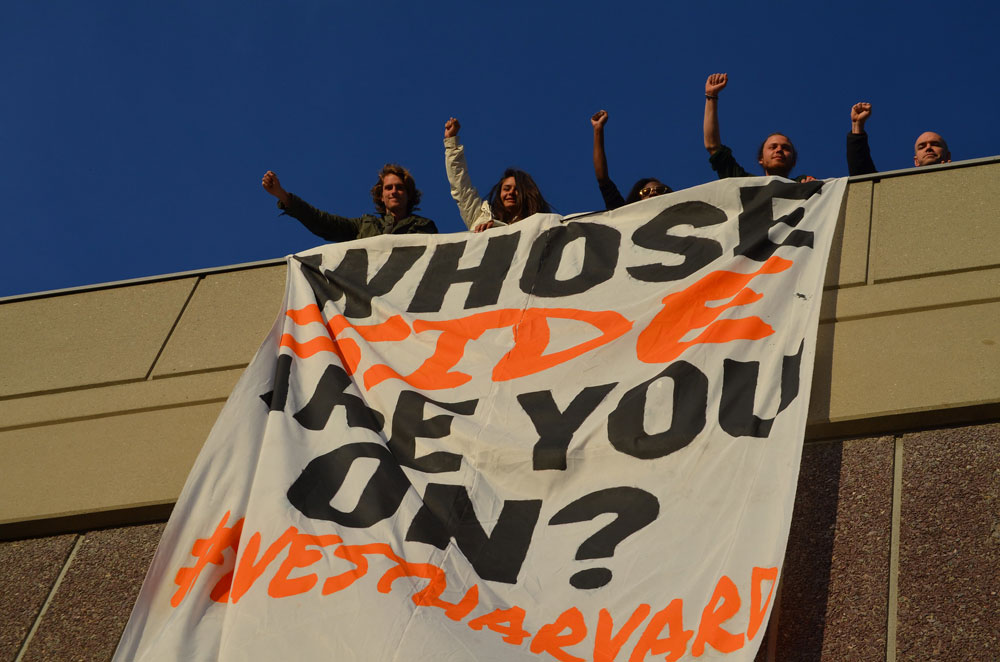
February 5, 2020; Harvard Crimson
“In a dramatic rebuke of administrators’ longstanding position on whether Harvard should invest in fossil fuels, the Faculty of Arts and Sciences voted overwhelmingly at its monthly meeting Tuesday to demand the Harvard Corporation divest the University’s endowment,” report James Bikales and Kevin Chen in the Harvard Crimson.
Bikales and Chen add, “The vote marks the culmination of a four–month–long debate in faculty meetings over the proper role of the University in combating climate change. Ultimately, 179 faculty members supported a motion in favor of divestment, while just 20 voted to oppose it.”
The faculty vote comes just one day after an alumni group called Harvard Forward announced it had obtained sufficient signatures to qualify a full slate of five candidates to contest the officially nominated slate of candidates for five open seats this year on the university’s Board of Overseers. Under Harvard’s bylaws, the group needed 2,936 alumni signatures, or one percent of all alumni, to sign a petition for a candidate to be placed on the ballot that way. Harvard rules also state that an alumni member can only sign one petition a year, meaning that nearly 15,000 signatures were required to place five candidates on the ballot. The group reported on Monday that they had collected well over 20,000 alumni signatures.
Harvard Forward’s platform, like the faculty group, calls for full divestment. The reform group also has a wider range of goals, focused on two categories: climate justice and responsible investing, and inclusive governance (including a provision that would mandate that one in five seats on the 30-member Board of Overseers be reserved for recent graduates).
The faculty proposal approved on Tuesday was authored by English department chair Nicholas Watson. The measure advises the Harvard Corporation—the University’s highest governing body—to instruct the Harvard Management Company (HMC) to withdraw and no longer pursue investments in companies that “explore for or develop further reserves of fossil fuels.” The proposal also asks the Corporation to replace HMC investment advisers who are “unwilling or unable to comply” with the motion to divest.
Up until now, Harvard’s leadership has been highly resistant to divestment, a resistance that Bikales and Chen document in detail. As they explain:
Sign up for our free newsletters
Subscribe to NPQ's newsletters to have our top stories delivered directly to your inbox.
By signing up, you agree to our privacy policy and terms of use, and to receive messages from NPQ and our partners.
A group of professors known as Harvard Faculty for Divestment has been calling for divestment for more than five years. In 2014, the group wrote an open letter to former University President Drew G. Faust and members of the Harvard Corporation urging fossil fuel divestment. More than 500 faculty have signed onto a letter posted to the group’s website asking the same of [current University President Larry] Bacow.
Bacow has maintained that the University’s endowment should not be used as a tool to enact social change, as have several of his presidential predecessors. Instead, he has said the University must work with industry players to address climate change, among other arguments.
In the wake of the overwhelming faculty vote, however, Bacow appears to be singing a new tune. Bacow says he will bring the motion to the Harvard Corporation for consideration and pledges that “the Corporation will give it the thought and consideration it deserves.” Bacow adds that the Harvard board will need some time to reach a decision, but that he expects to inform the faculty of the Corporation’s response before the semester ends in May.
The move for Harvard to divest is no isolated action. Internationally, to date, an estimated total of 1,181 institutional investors (including churches, universities, foundations, governments, pension funds, cultural institutions, and others) with control over an estimated $13.96 trillion in assets have chosen to divest from at least some fossil fuel investments. One notable university example is the 10-campus University of California system, as NPQ covered last fall.
Even more recently, last month, Larry Fink, CEO of BlackRock, the world’s largest investment firm with nearly $7 trillion in assets, said that his firm, while not divesting fully, was seeking to move away from fossil fuel investments, noting that “climate risk is economic risk.”
At the faculty meeting, economics professor Stephen Marglin likened Harvard’s resistance to divesting from fossil fuels to its prior refusal to divest from companies conducting business with the apartheid government in South Africa.
“The question before us today is whether this faculty supports divestment and decarbonization now, when we can possibly influence others to follow our lead, or we wait, as we did in the case of South Africa, until nobody cares. We are voting on divestment and decarbonization, but we are also voting on the honor of this university.”—Steve Dubb










